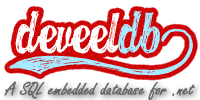|
| static bool | ObjectExists (this IQueryContext context, ObjectName objectName) |
| |
| static bool | ObjectExists (this IQueryContext context, DbObjectType objectType, ObjectName objectName) |
| |
| static IDbObject | GetObject (this IQueryContext context, DbObjectType objType, ObjectName objName) |
| |
| static IDbObject | GetObject (this IQueryContext context, DbObjectType objType, ObjectName objName, AccessType accessType) |
| |
| static bool | DropObject (this IQueryContext context, DbObjectType objectType, ObjectName objectName) |
| |
| static void | AlterObject (this IQueryContext context, IObjectInfo objectInfo) |
| |
| static ObjectName | ResolveObjectName (this IQueryContext context, string name) |
| |
| static ObjectName | ResolveObjectName (this IQueryContext context, DbObjectType objectType, ObjectName objectName) |
| |
| static IDbObject | FindObject (this IQueryContext context, ObjectName objectName) |
| |
Definition at line 9 of file QueryContext.Objects.cs.
Definition at line 90 of file QueryContext.Objects.cs.
91 if (objectInfo == null)
92 throw new ArgumentNullException(
"objectInfo");
94 if (!context.UserCanAlterObject(objectInfo.ObjectType, objectInfo.FullName))
97 context.Session().AlterObject(objectInfo);
Definition at line 65 of file QueryContext.Objects.cs.
67 if (!context.UserCanCreateObject(objectInfo.ObjectType, objectInfo.FullName))
68 throw new InvalidOperationException();
70 context.Session().CreateObject(objectInfo);
Definition at line 73 of file QueryContext.Objects.cs.
75 context.DropVariable(objectName.Name)) {
79 context.DropCursor(objectName.Name)) {
83 if (!context.UserCanDropObject(objectType, objectName))
86 context.Session().DropObject(objectType, objectName);
DbObjectType
The kind of objects that can be handled by a database system and its managers
Definition at line 39 of file QueryContext.Objects.cs.
static IDbObject GetObject(this IQueryContext context, DbObjectType objType, ObjectName objName)
Definition at line 43 of file QueryContext.Objects.cs.
49 var obj = context.FindCursor(objName.Name);
53 var obj = context.FindVariable(objName.Name);
59 if (!context.UserCanAccessObject(objType, objName))
60 throw new InvalidOperationException();
62 return context.Session().GetObject(objType, objName, accessType);
DbObjectType
The kind of objects that can be handled by a database system and its managers
| static bool Deveel.Data.Sql.QueryContextExtensions.ObjectExists |
( |
this IQueryContext |
context, |
|
|
ObjectName |
objectName |
|
) |
| |
|
inlinestatic |
Definition at line 10 of file QueryContext.Objects.cs.
13 if (context.CursorExists(objectName.Name))
15 if (context.VariableExists(objectName.Name))
20 return context.Session().ObjectExists(objectName);
Definition at line 23 of file QueryContext.Objects.cs.
27 context.CursorExists(objectName.Name))
31 context.VariableExists(objectName.Name))
36 return context.Session().ObjectExists(objectType, objectName);
DbObjectType
The kind of objects that can be handled by a database system and its managers
| static ObjectName Deveel.Data.Sql.QueryContextExtensions.ResolveObjectName |
( |
this IQueryContext |
context, |
|
|
string |
name |
|
) |
| |
|
inlinestatic |
Definition at line 100 of file QueryContext.Objects.cs.
101 if (context.VariableExists(name) ||
102 context.CursorExists(name))
103 return new ObjectName(name);
105 return context.Session().ResolveObjectName(name);
Definition at line 108 of file QueryContext.Objects.cs.
110 context.VariableExists(objectName.Name))
111 return new ObjectName(objectName.Name);
113 context.CursorExists(objectName.Name))
114 return new ObjectName(objectName.Name);
116 return context.Session().ResolveObjectName(objectType, objectName);
DbObjectType
The kind of objects that can be handled by a database system and its managers
The documentation for this class was generated from the following file:


 1.8.10
1.8.10